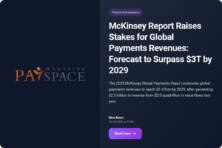The European Central Bank is demonstrating a kind of determination as part of its aspirations to begin implementing a policy of cutting interest rates before similar decisions are made by the Federal Reserve System.

The financial regulator of the European Union will begin lowering the cost of borrowing before the relevant actions are taken by the central bank of the United States, but this does not mean absolute autonomy and independence of the subsequent course. For the ECB, it is not an unsolvable or extremely difficult task to cut interest rates before similar decisions by the Fed, but the subsequent policy concept of the European financial institution will still be adjusted one way or another, depending on what measures will be introduced on the other side of the Atlantic Ocean.
The historically formed practice of interconnection in the financial space indicates that what is happening in the economic system of the United States in the shortest possible time becomes a factor of sensitive impact at the global level. In this case, it is implied that the decisions of the Fed are in a certain way taken into account in a practical sense by central banks in other countries. The actions of the financial regulator of the United States adjust exchange rates almost from the moment of its accomplishment. The Fed’s decisions also have an impact on inflation and trade on a global scale. Moreover, the actions of the US central bank largely determine financial conditions at the worldwide level. Policymakers in other countries cannot avoid the impact of the Fed’s decisions in shaping their economic development concepts. This feature is due to the specifics of the current configuration of the international financial system.
ECB officials will hold a meeting next week to discuss future actions in the context of cutting interest rates. Attention will be paid to how quickly to move in the direction opposite to the strategy of aggressive monetary policy tightening. ECB officials will also discuss the potential scope of upcoming actions to lower borrowing costs. The EU financial regulator will still pay attention to the Fed’s decisions, despite the statement of categorical independence in forming the concept of monetary policy.
Piet Christiansen, chief strategist at Danske Bank, says that the ECB can certainly act ahead of the central bank of the United States. At the same time, the expert notes the minimal probability that the policy of the European financial regulator will differ significantly from the Fed’s strategy. In this context, Piet Christiansen noted that the decisions of the central bank of the United States will eventually spread to the EU and will become a determining factor for the eurozone in many ways.
ECB officials, led by Christine Lagarde, are preparing markets for an initial cutting of interest rates in early June. Currently, the EU is experiencing a steady tendency to ease price pressure, which is a circumstance that forms a favorable external background for easing the monetary policy of the European financial regulator.
ECB officials have stated very unequivocally and decisively the position that they will not be guided by the point of view of Fed Chair Jerome Powell regarding lowering interest rates. At the same time, the European financial regulator has not yet committed itself to any actions after the first stage of monetary policy changes towards easing. In the context of the corresponding issue, ECB officials emphasize that the subsequent strategy will be determined by economic data.
Among traders, the most common position is that the European financial regulator will conduct four cutting of interest rates in the current year. At the same time, there are significant doubts in the market that the Fed will lower the cost of borrowing two or three times in 2024. The corresponding point of view was formed after Jerome Powell this week stated that there was no intention to rush into action in the context of the issue of monetary policy easing.
More than two years ago, a cycle of the increase in interest rates began in the United States. Against the background of the actions of the financial regulator, the US economic system demonstrates amazing stability. Moreover, local employers continue to actively hire workers. If the mentioned state of affairs continues to be an objective reality in the foreseeable future, it will become a factor in supporting the European economy, which last winter was on the verge of recession and miraculously managed to avoid the implementation of such a negative scenario.
Last Wednesday, April 3, during a speech at Stanford University in California, Jerome Powell said that it was too early to draw any final conclusions about the dynamic inflation in the United States and the subsequent vector of this process. He also noted that, in the Fed’s opinion, cutting interest rates would not be an appropriate solution until more stable confidence is formed that the growth in the cost of goods and services in the US is on a stable trajectory toward the financial regulator’s target of 2%.
Signs of economic recovery have been recorded in the EU recently. Purchasing managers are optimistic about the prospects of the immediate future. In their opinion, economic growth is a realistic scenario. In this case, the prospects for the near future are implied.
In March, inflation in 20 eurozone countries slowed more than expected. Currently, this indicator stands at 2.4% and shows a gradual approach to the ECB’s target of 2%.
There is an opinion in the expert community that inflation in the EU in August may be less than 2%. Also, supporters of this vision of the prospects of the dynamic the mentioned indicator assume that next year the average level of this figure will be 1.4%. The ECB predicts that in 2025 inflation will be 2%.
Jamie Rush, an expert at Bloomberg Economics, underlined in his note that the European financial regulator has already made a mistake in assessing the scale of price pressure. In his opinion, for the mentioned reason, the ECB will act cautiously as the easing cycle gets underway. The expert also says that it is still reasonable to expect a deep lowering of interest rates in 2024. Moreover, Jamie Rush expects that the deposit rate in the EU will be changed this year, as a result of which the corresponding figure will be fixed at around 3%.
Even though, as above-mentioned, the Fed’s actions are a factor of global impact, the ECB has already demonstrated examples that its officials can make decisions that differ from the measures of their colleagues working in the United States. In December 2015, the European financial regulator cut interest rates. In March 2016, the ECB repeated the mentioned actions. At that time, the central bank of the United States began a three-year cycle of borrowing cost increases. This year, the Swiss National Bank has already demonstrated an example of solutions that differ from the Fed’s approach. This financial institution cut interest rates in March. The Swiss National Bank made the corresponding decision to prevent the franc from strengthening.
Currently, there is no consensus among economists on what consequences the situation of the different approaches of the ECB and the Fed may provoke. Some experts say that aggressive easing of monetary policy may cause increased inflationary pressures in the eurozone. Proponents of the corresponding point of view separately note that a lower cost of borrowing compared to the indicator in the United States may weaken the euro and become an additional risk factor due to higher import prices.
At the same time, former ECB chief economist Peter Praet says that the continuation of the Fed’s tighter-than-expected monetary policy may provoke a more widespread deterrent effect on the EU economic system. Also, according to the expert, such a strategy of action by the central bank of the United States may force European officials to lower the cost of borrowing even more than they assume.
Peter Praet says that there is currently a real risk that the expectations of cutting interest rates will not be met. According to the expert, the implementation of the corresponding scenario will tighten financial conditions around the world. Peter Praet said that the ECB should not dismiss the possibility that at some point there will be a need for more aggressive interest rate cutting.
Investors are already showing signs of preparing for losses in the European currency. Data from the Depository Trust & Clearing Corporation shows that last week, twice as many contracts were concluded in the options market that were negative on the euro than there were positive.
Some traders expect the European currency to slump to $1.05 shortly from about $1.08 on Wednesday. If the corresponding dynamic is implemented, euro/dollar parity will be into view for the first time since 2022.
Valentin Marinov, head of G-10 currency strategy at Credit Agricole, suggests that the ECB will surpass not only the Fed but also most other central banks. The expert refers to the weak prospects for economic growth in the EU and subsiding in inflation.
Lena Komileva, chief economist at G Plus Economics, says that at some point the ECB may face the need to lower the euro exchange rate as part of countering the risk of recession. According to the expert, the corresponding need is possible if the Fed does not cut interest rates shortly. It is worth noting that ECB officials are wary of a weakening of the euro.
As we have reported earlier, Federal Reserve Bank of Atlanta President Expects One Rate Cut in 2024.









